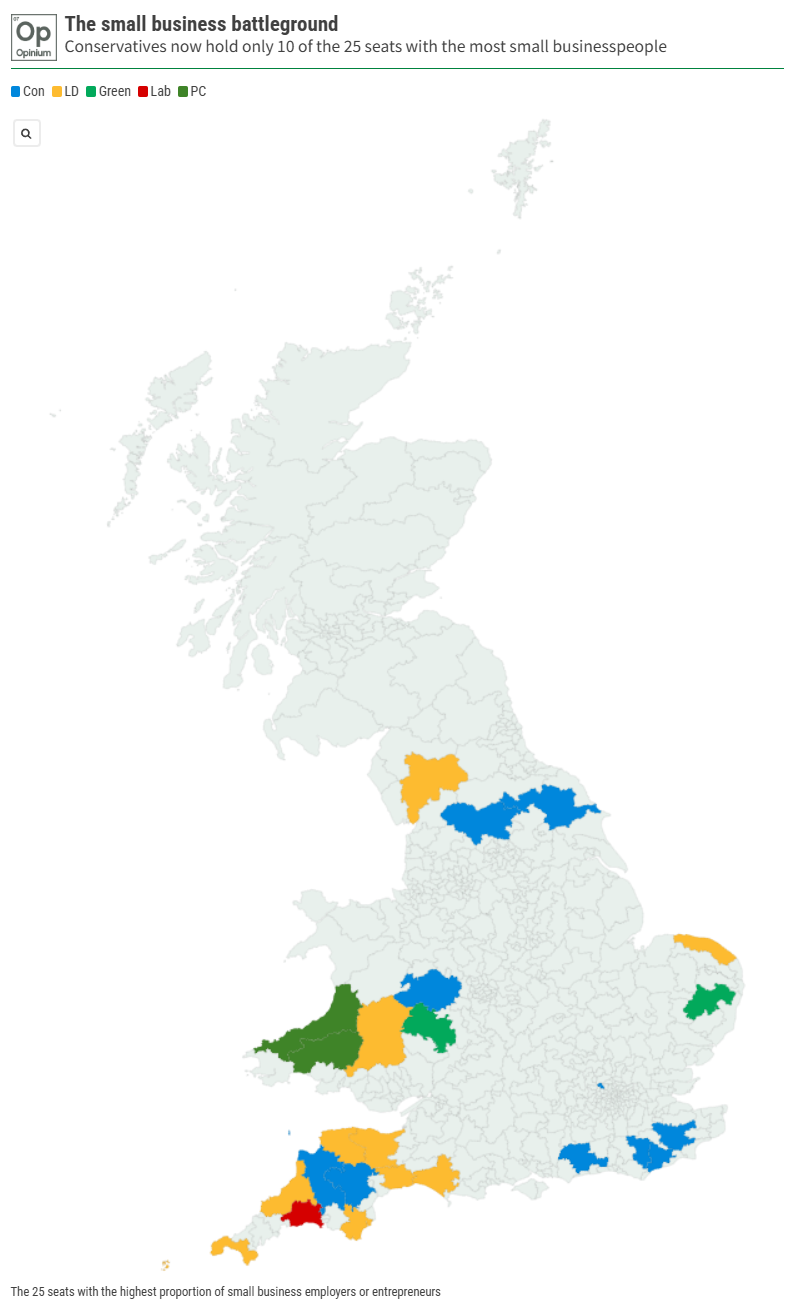James Crouch is head of policy and public affairs research at Opinium.
Business has long been a natural ally of the Conservative Party. There are good reasons for that: belief in enterprise and private initiative have been core Conservative tenets. But too often, when everyone speaks about “business”, the default is to think about multinationals and the CBI. In truth, it is the small business owner, the entrepreneur, and the self-employed who form not only most of the business community in the wider economy, but also a crucial part of the Conservative electoral coalition.
Roughly one in ten UK adults are best described as small business employers or entrepreneurs. That is a huge part of the electorate, and it is worth remembering that these voters are more likely to turn out at election time than the public as a whole. This means that small businesspeople make up an even bigger share of the voting public than they do of the country at large.
The electoral challenge
Here, unfortunately, is where I need to bring in some of the bad news. Of the 25 constituencies with the highest proportion of small business voters, the Conservatives held 24 at the last election. In 2024, that number fell to just ten seats.
While that is serious damage to the Conservatives in its heartlands, it is worth underlining two important caveats. First, holding on to even ten of those seats represents a pretty decent foothold in the context of such a small parliamentary party. Second, the main threat in these places did not come purely from Reform UK. Reform polled 14 per cent in these seats, actually below their national average. The more striking trend was the rise of the parties to the left of the Conservatives, which collectively increased their vote share by 10 per cent in these constituencies, double the national rate.
The fact that the Conservatives ceded so much ground in areas with many focused on economic and business issues should give pause for thought. But it also highlights an opportunity to rebuild. These voters have not suddenly become natural left-wing voters, nor are they solidly backing Reform. And as the latest polling suggests, with the right approach, the Party is well placed to win them back.

What the numbers say
Opinium recently polled 500 SME leaders across the UK for Conservatives For Business. Not just in those 25 constituencies, but nationwide, looking at the small business voting bloc that appears in every corner of the country.
The results offer Conservatives some encouragement. Unlike wider public polling, where the Party is struggling to remain competitive, among small business leaders the Conservatives remain firmly in contention. On the question of which party is best to support small or local businesses, the Conservatives are level with Labour on 20 per cent, with Reform in third place at 17 per cent.
That might not sound like a ringing endorsement, but in the current political climate there are two key aspects to this. Firstly, the Conservatives are on far more natural ground in showing why they are the better choice than a Labour government that is implementing a range of unpopular taxes on businesses – and it is against Labour that the Party wants to build a lead. Secondly, Reform UK is only on 17 per cent, and the inconsistency in Reform’s electoral coalition on matters relating to economic policy and business makes this a weakness worth exploiting.
Even more importantly, these voters are still listening. Just over half (51 per cent) of SME leaders believe the Conservatives are interested in them and their challenges, higher than Labour (43 per cent) or the Liberal Democrats (46 per cent), and equal with Reform. That gives the Party a platform from which to re-engage.
What small businesses want
So what are these voters asking for? The answer is not complicated, but it is urgent.
Above all, small business leaders want lower costs: 42 per cent cite reducing energy bills as their top priority, 41 per cent want lower overall business taxes, and 25 per cent want simpler regulation. In other words: they want the everyday burdens of keeping a small business afloat addressed, and the difficulties the current government is placing on them opposed.
This aligns naturally with a Conservative offering, and crucially, the polling shows that SME leaders agree. The Party leads by 4 points as the most trusted to set business taxes (24 per cent versus 20 per cent for Labour and 19 per cent for Reform). It is 5 points ahead as the party to set personal taxes too (25 per cent versus 20 per cent for Labour).
The foundations, then, are already there. The entrepreneurs and employers of Britain are signalling both what they need and who they think can deliver it.
A route back to government
None of this is to suggest that rebuilding the Party’s relationship with small businesses will be easy. The scale of the electoral losses last year shows that confidence took a knock. But in political and electoral terms, this is the closest the Party gets to low-hanging fruit.
The Conservatives do not need to reinvent their pitch to these voters, they need only to make this a priority: backing entrepreneurs, cutting costs, simplifying taxes and regulation. The polling suggests small business owners hope the Party is listening, so it is open to the Conservatives to make a play at winning them back.
If the Party has the chance to show again that it is the natural home for small businesses, not only is that a route back to winning formerly safe seats, but it is also the first step in any route back to government.











![Trump, Hegseth to Get Troops Paid Despite Dems Voting Against it Eight Times [WATCH]](https://www.right2024.com/wp-content/uploads/2025/10/Trump-Hegseth-to-Get-Troops-Paid-Despite-Dems-Voting-Against-350x250.jpg)





